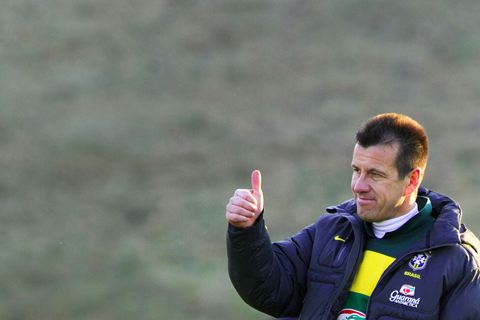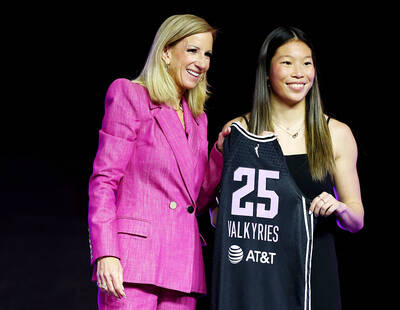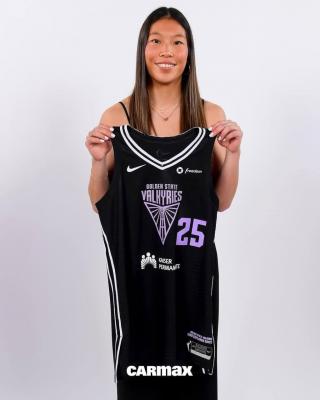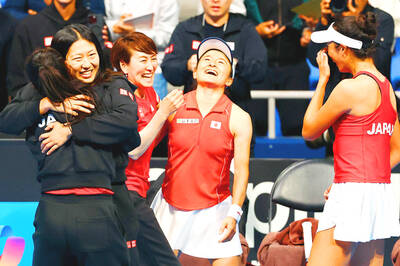Brazil is probably the only major soccer-playing country where reporters can join in goal celebrations and interview players as they fight on the pitch.
Dozens of television and radio reporters stand on the touchlines at games in Brazil, interviewing players seconds before kick-off, at halftime and when they storm off the pitch after being shown a red card.
If a fight breaks out, they run onto the pitch and try and get a few quick quotes. When a player scores, he will often go straight to the cameras and microphones so his celebration can be broadcast to millions of listeners.

PHOTO: AFP
Last year, Ronaldo, playing his first domestic game in Brazil for 15 years, left the field with a black eye after he was hit on the head by a microphone and a television camera in a media scrum on the field at the end of the match.
After so long in Europe, he was shocked at finding reporters on the field.
“I can’t answer questions when I’m warming up,” he said.
For the hundreds of Brazilian reporters who are sent to the World Cup, the set-up, with no pitch access, can be a shock.
They have, however, traditionally enjoyed access to players that colleagues from other countries can only dream of.
Even at the height of a World Cup, Brazil would organize a daily “mixed zone” in which the players would walk alongside a barrier on their way back to the team bus, answering questions from the several hundred people in the media pack on the other side of the fence.
Although something of a sweaty scrum, it generally worked well. This World Cup, however, has been completely different.
Coach Dunga has replaced the sacred mixed zone with a daily conference in which two selected players trot out the usual cliches to a room of 400 reporters.
He has even done the unthinkable and restricted access to training sessions — often broadcast live in Brazil.
The new policy has been especially tough on radio reporters, who have hours of air time to fill. Radio is still hugely important in Brazil, where many people still do not have Internet access.
“We have to talk on seven programs every day and the hourly news bulletins,” Radio Itatiaia reporter Wellington Campos said. “In the past, it was always very open, not just for the Brazilians but also for foreigners, you could choose the player you wanted to speak to. That’s over.”
This has led to tensions between the media and the team, especially as Dunga has included the powerful Globo television network — Brazil’s rights holders — in his clampdown.
Four years ago, players would take part in round tables and give exclusive interviews to Globo but, under Dunga, they are treated the same as everyone else.
Tensions boiled over after Sunday’s win over Ivory Coast, with an exchange between Dunga and a Globo journalist during the post-match press conference.
Brazilian media said Dunga was heard to swear under his breath.
Globo later criticized the coach’s behavior and has since refused to use his name.
With the battle set to continue, Brazil’s 2002 World Cup winning coach Luiz Felipe Scolari suggested a truce.
“We have to put up with each other,” he said. “The best thing is to work together, and when the World Cup finishes, each side can tell the other to go to hell.”

College basketballer Kaitlyn Chen has become the first female player of Taiwanese descent to be drafted by a WNBA team, after the Golden State Valkyries selected her in the third and final round of the league’s draft on Monday. Chen, a point guard who played her first three seasons in college for Princeton University, transferred to the University of Connecticut (UConn) for her final season, which culminated in a national championship earlier this month. While at Princeton, Chen was named the Ivy League tournament’s most outstanding player three times from 2022 to last year. Prior to the draft, ESPN described Chen as

College basketballer Kaitlyn Chen (陳凱玲) has become the first player of Taiwanese descent to be drafted by a WNBA team, after being selected by the Golden State Valkyries in the third and final round of the league's draft yesterday. Chen, a point guard who played her first three seasons in college for Princeton University, transferred to the University of Connecticut (UConn) for her final season, which culminated in a national championship on April 6. While at Princeton, Chen was named the Ivy League tournament's most outstanding player three times from 2022 to last year. Prior to the draft, ESPN described Chen as a

Japan yesterday secured a second consecutive Billie Jean King Cup finals appearance with a 2-1 win over 2023 champions Canada, thanks to Ena Shibahara and Shuko Aoyama’s 6-3, 5-7, 6-2 win over Kayla Cross and Rebecca Marino in the qualifying doubles decider. Shibahara and Aoyama powered through the opening set 6-3, breaking twice for a quick 3-0 lead. Cross and Marino hit back in the second, edging it 7-5 to level the match, before the Japanese pair regained control in the third. Canada’s 18-year-old Victoria Mboko edged Shibahara 6-4, 6-7 (8/10), 7-5 in a marathon opening clash. Mboko fired eight aces to

DAY OF BLOWOUTS: Elsewhere, the Lakers clinched the third seed in the Western Conference with a 140-109 pounding of the under-strength Houston Rockets The Denver Nuggets on Friday improved their playoff position, with a triple double from Nikola Jokic helping them to a 117-109 win over the Memphis Grizzlies. The Serbian put up 26 points, 13 assists and 16 rebounds. The triple-double performance, his 34th this season, ensured that he will finish the regular season as just the third NBA player to average a triple double across an entire season. The win meant the Nuggets improved to 49-32 on the season and gave them a real chance of grabbing fourth place and home-court advantage in the playoffs. Aaron Gordon top scored with 33 points for Denver,